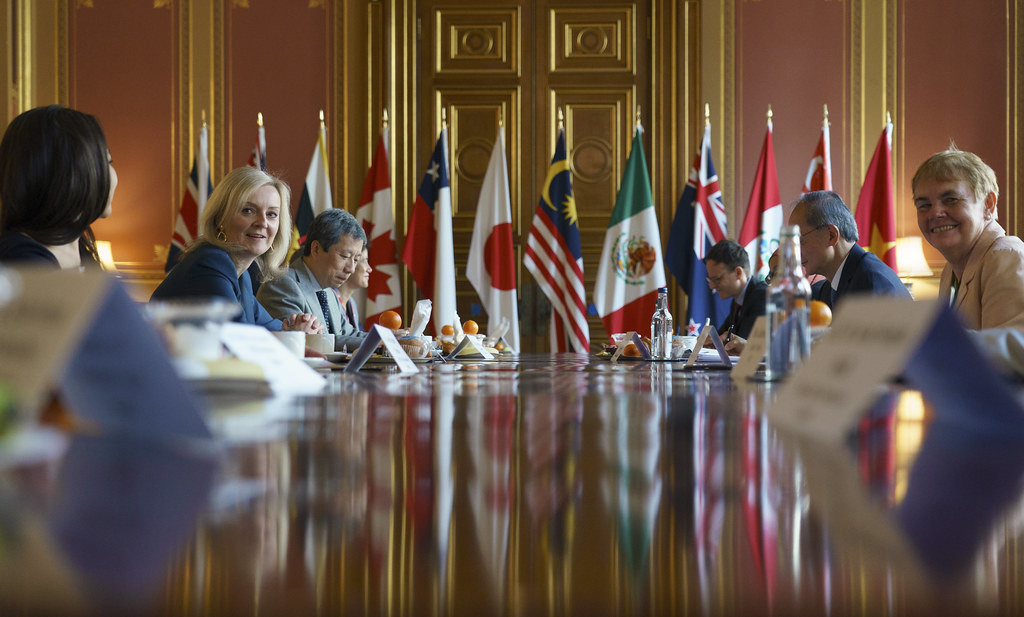UK accelerates talks with TPP members after closing Japan trade deal
Nikkei Asian Review | 13 September 2020
UK accelerates talks with TPP members after closing Japan trade deal
YUSUKE NAKAJIMA, Nikkei staff writerSeptember 13, 2020 19:00 JST
LONDON — The U.K. will hold multiple rounds of talks with the 11 member states of the Trans-Pacific Partnership with an eye on joining the trade pact, its trade minister said in an interview with Nikkei.
U.K. International Trade Secretary Liz Truss explained the nation’s next step after having just reached an economic partnership agreement with Japan.
Until the end of the year, trade between Japan and the U.K. will enjoy preferential tariffs under an EPA between Japan and the European Union. There were concerns that tariffs would rise suddenly when Britain exits the EU if Japan and the U.K. did not sign a new trade deal by Dec. 31, which is when the transition period ends.
To prevent this, the two nations entered negotiations in June and reached a basic agreement in a videoconference between Truss and Japanese Foreign Minister Toshimitsu Motegi on Friday. Regarding talks between Britain and the EU over a free trade agreement, which some say is at risk of collapsing, Truss said, "We remain committed to working hard to reach an agreement."
Truss also spoke about Britain’s efforts to join the 11-member TPP, formerly the Comprehensive and Progressive Agreement for Trans-Pacific Partnership.
Edited excerpts of the interview follow.
Q: Could you explain the importance of the U.K.-Japan FTA?
A: This deal is very important to the U.K. It strengthens our relationship with Japan as the world’s third-largest economy and as one of our most important trading partners. It also marks a key moment in our future trade policy, as it is our first deal as a newly independent trading nation.
Moreover, we have not only locked in the benefits of the EU-Japan deal, but have also gone beyond it in a number of areas. Take digital and data, for example, where we have been able to agree on cutting-edge provisions that reflect the status of U.K. and Japan as technology superpowers.
Strategically, it puts the U.K. at the center of a network of free trade agreements, both giving our businesses a gateway to the Asia-Pacific region and strengthening our status as a global hub for business and investment. It also marks a crucial step towards our joining the Comprehensive and Progressive Agreement for Trans-Pacific Partnership (CPTPP), one of the world’s largest free trade areas.
Q: What is the current situation toward formal application for TPP membership? And when will the formal application for membership be made?
A: I was pleased to chair a constructive conversation with ambassadors and representatives from CPTPP member countries in London in July and met with chief negotiators from all 11 members of the partnership just last week to discuss potential U.K. accession. We continue to take forward discussions at the senior-official level. This is all part of the accession process for new CPTPP members which encourages countries to engage informally with every CPTPP member, addressing any concerns and questions before submitting a formal accession application.
It will put us in a position to work alongside a network of countries like Japan to commit to free trade, sending a powerful signal to the rest of the world that we are prepared to champion free trade liberalization, fight protectionism and remove barriers at every opportunity.
We have not yet confirmed our timeline for formal application, but any final application decision we make will depend on the progress of bilateral negotiations with CPTPP members and our confidence that we will be able to negotiate accession on terms which make sense for the U.K.’s broader interests and domestic priorities. We’re grateful for Japan’s support in this regard.
Q: What were the difficulties the negotiation team faced during these U.K.-Japan FTA negotiations? I understand that agricultural products such as cheese remained a sticking point.
A: There is an old saying that "nothing is agreed until everything is agreed" and the fact that agricultural market access was one of the final issues I think highlights that. Agriculture is almost always the last area to be agreed in any trade negotiation — so this doesn’t come as a surprise. I’m pleased that we’ve secured a deal that works for agri-food exporters and consumers alike.
Japanese consumers will be able to access properly identified flagship U.K. products like English sparkling wine, Welsh lamb, and Yorkshire Wensleydale cheese as early as next year. I also look forward to seeing U.K. consumers enjoying Kobe beef and sake.
Obviously, the circumstances of the COVID-19 pandemic have presented formidable challenges. We have followed public health guidance, which has meant the normal process of face-to-face negotiations has not happened. This has forced us to innovate. It means that this is the first deal ever negotiated entirely online, and, we believe, the quickest trade deal in history. That is a formidable achievement, and I think it is a reflection of our shared outlook, values, and determination to reach agreement.
Q: FTA negotiations with the EU have not gone smoothly recently. And reaching an agreement with the U.S. before its presidential election in November appears difficult.
A: Talks with the U.S. continue to be positive and constructive, with progress being made towards a comprehensive agreement. Round 8 of U.K.-EU negotiations have now concluded and we remain committed to working hard to reach an agreement.
People have often said the U.K. would never be able to strike major trade deals outside the EU — or at the very least such deals would be bad and take years to conclude. In reaching this deal with Japan, we have proved the critics wrong. And as we continue to leverage our independence as an outward-looking trading nation, embracing the golden opportunities ahead for global trade, I am optimistic we will do so again.






